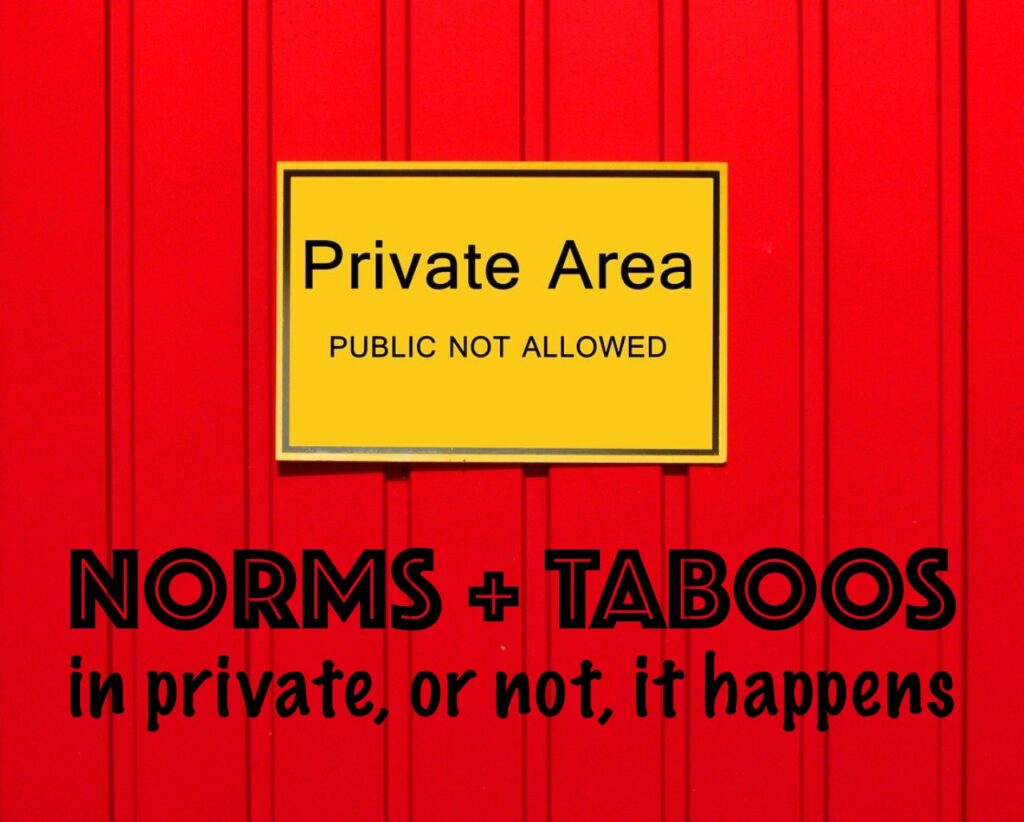Norms – certain types of behaviors in a society that are considered to be the standard
Taboos – things that are forbidden in a society or culture

Normalize. Culture is changing. Culture is adaptive. Norms are rules of behavior in a society. Societies have subtle and more overt ways of communicating norms and keeping us from straying too far from behaving in ways that seem “normal.” Stereotyping language, especially from those with power and visibility, becomes a norm, part of the culture. Norms can change, however, when they are no longer adaptive.
Anthropologists specialize in making the strange more familiar through ethnographies of the everyday lived experience, however, they have been challenged for perpetuating the “othering” or fetishization of “strange” culture, about whom they write. Our installations followed the familiar anthropological path of illuminating the experience of those often considered “the strange” or “the other” to the point at which this “othering” leads to stereotyping and has very real and tangible negative effects on the daily lives, health, livelihoods of the stereotyped. It hopes that, by confronting your own discomfort with your participation in the stereotyping process, you will challenge stereotypes encountered in your daily lives.
“Cultural anthropology is not valuable because it uncovers the archaic in the psychological sense. It is valuable because it is constantly rediscovering the normal.” — Edward Sapir
||| Explore the Literature |||
Gill, Lyndon K. 2018. Erotic Islands: Art and Activism in the Queer Caribbean. Duke University Press.
Summary from publisher: In Erotic Islands, Lyndon K. Gill maps a long queer presence at a crossroads of the Caribbean. This transdisciplinary book foregrounds the queer histories of Carnival, calypso, and HIV/AIDS in the Republic of Trinidad and Tobago. At its heart is an extension of Audre Lorde’s use of the erotic as theory and methodology. Gill turns to lesbian/gay artistry and activism to insist on eros as an intertwined political-sensual-spiritual lens through which to see self and society more clearly. This analysis juxtaposes revered musician Calypso Rose, renowned mas man Peter Minshall, and resilient HIV/AIDS organization Friends For Life. Erotic Islands traverses black studies, queer studies, and anthropology toward an emergent black queer diaspora studies.
Kulick, Don and Willson, Margaret, eds. 1995. Taboo: Sex, Identity, and Erotic Subjectivity in Anthropological Fieldwork. New York: Taylor & Francis.
Summary from bookseller: Taboo looks at the ethnographer and sexuality in anthropological fieldwork and considers the many roles that sexuality plays in the anthropological production of knowledge and texts. How does the sexual identity that anthropologists have in their “home” society affect the kind of sexuality they are allowed to express in other cultures? How is the anthropologists’ sexuality perceived by the people with whom he or she does research? How common is sexual violence and intimidation in the field and why is its existence virtually unmentioned in anthropology? These are but a few of the questions to be confronted, exploring from differing perspectives the depth of the influence this tabooed topic has on the entire practice and production of anthropology.
Leavitt, Gregory C. 2007. “The Incest Taboo? A Reconsideration of Westermarck.” Anthropological Theory, 7, no. 4 : 393-419.
Abstract: The ongoing discussion between social scientists who espouse some variety of socio-environmental theory (for examples see Leavitt, Incest and Inbreeding Avoidance: A Critique of Darwinian Social Science, 2005: 215 and Leavitt, `Disappearance of the Incest Taboo’, American Anthropologist, 1989) and those who advance Darwinian selection principles (human sociobiology, Darwinian social science, behavioral genetics, or evolutionary psychology) have often focused their debate on the incest taboo and the avoidance of inbreeding. Acknowledged by many as an important cultural universal, the incest taboo has commonly been recognized by Darwinian social scientists as the most compelling instance supporting the premise that complex human behaviors can result from natural selection. Human sociobiology forwards the argument that natural selection mechanisms will favor outbreeding because inbreeding is deleterious. By contrast, socio-environmentalists have made the case that the incest taboo is a socioculturally derived solution to important practical problems found in human social life. In this article, I not only challenge the commonly held notion that inbreeding is injurious, but also argue that inbreeding is often harmless and even fitness-enhancing. If so, Westermarck’s hypothesis that children raised together naturally trigger selection mechanisms for sexual avoidance is highly questionable. Rather, incest and inbreeding avoidance are diverse practices related to environmental circumstances.
Sigmund, Freud. 1950/1913. Totem and Taboo. New York/London: Routledge.
Summary from bookseller: Adducing evidence from “primitive” tribes, neurotic women, child patients traversing the oedipal phase, and speculations by Charles Darwin, James G. Frazer, and other modern scholars, Freud attempts to trap the moment that civilized life began. It stands as his most imaginative venture into the psychoanalysis of culture.
Zhang, Weiguo. 2020. “Is Death Taboo for Older Chinese Immigrants? Journal of Death and Dying.
Abstract: Much of the scholarly literature sees death as a taboo topic for Chinese. To test this assumption, this study held seven focus groups in the Greater Toronto Area in 2017. It found that the majority of the older Chinese immigrant participants talked about death freely using either the word death or a euphemism. They talked about various issues including medical treatment and end-of-life care, medical assistance in dying, death preparation, and so on. A small number did not talk about death, but it seemed their reluctance was related to anxiety or discomfort or simply reflected a choice of words. The study concludes death as taboo could be a myth, at least for older Chinese immigrants.